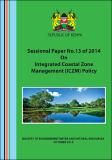| dc.date.accessioned | 2020-08-10T09:26:07Z | |
| dc.date.available | 2020-08-10T09:26:07Z | |
| dc.date.issued | 2014 | |
| dc.identifier.uri | http://repository.kippra.or.ke/handle/123456789/736 | |
| dc.description.abstract | The coastal zone is endowed with rich multiple-use resources which are of great socio-economic significa1.1ce to the local community and the nation at large. The need for the ICZM Policy framework is premised by the failure of the largely sectoral-based resource management approach to adec1uately address the crosscutting developmental and environmental issues. The sectoral-based planning, development and management of the resources, compounded with pressure from rapid population growth, have spawned resource use conflicts and adverse socio-economic and environmental effects.
The ICZM Policy is the culmination of a consultative and participatory process involving lead government agencies, NGOs, CBOs and other stakeholders actively engaged in the utilisation and management of resources along the coastal zone. Development of the policy \Vas informed by, among others, the report on the State of the Coast prepared under the stewardship of NEMA, and the draft National Environment Policy. Finalisation of the policy preparation process coincided with the promulgation of the constitution for the country in August 2010. This prompted revision of the policy to align it with the constitution on
matters pertaining to environment and development. As such the ICZM Policy recognizes the state and public obligations in relation to the environment and the right of participation by citizens in environmental matters and processes that affect their lives as outlined in Article 69 in the constitution. The vision of the ICZM Policy is "A coastal zone with health ecosystem and resources that sustain the socio-economic development and well-being the current and future generations". It seeks to promote sustainable development in the coastal zone in line with the principles of the constitution and objectives of Vision 2030. | en_US |
| dc.language.iso | en | en_US |
| dc.publisher | Ministry of Environment, Water and Natural Resources | en_US |
| dc.relation.ispartofseries | Sessional Paper;2014 | |
| dc.subject | Coastal Zone | en_US |
| dc.subject | Coral Reefs | en_US |
| dc.subject | Mangrove Forests | en_US |
| dc.subject | Cultural Heritage | en_US |
| dc.subject | Seagrass Beds | en_US |
| dc.subject | Resource Use Conflict | en_US |
| dc.subject | Deltas | en_US |
| dc.subject | Estuaries | en_US |
| dc.subject | Kenya | en_US |
| dc.title | Sessional Paper No.13 of 2014 on Integrated Coastal Zone Management (ICZM) Policy | en_US |
| dc.type | Sessional Paper | en_US |
| ppr.contributor.author | Ministry of Environment, Water and Natural Resources | en_US |

